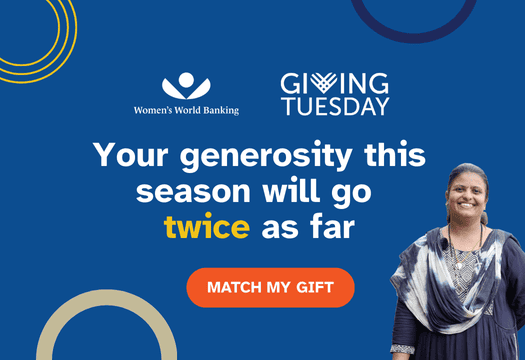To celebrate Women’s World Banking’s 45th anniversary, we are showcasing the voices of individuals from around the world who have shaped and touched Women’s World Banking’s journey since its inception in 1979 at Commission on the Status of Women to today! These are stories from across Women’s World Banking’s reach from the women we serve and our customers, to allies and women in leadership who have contributed to women’s economic empowerment and financial inclusion.
Meet Allen. She is a shop owner in Kampala, Uganda who was faced with a life-altering challenge when she got severely injured in a traffic accident while returning from her sister’s wedding. Unable to work due to her injuries, she risked losing her business. In Uganda, 30% of the population lives below the poverty line, and women, in particular, face higher risks as their businesses are more vulnerable to liquidation during crises.
Women’s World Banking developed a microinsurance program called “Caregiver” in partnership with Finance Trust Bank designed specifically for women. Allen shared, “Because I was a member of Finance Trust Bank, I got insurance. I needed help, and my insurance supported me in paying hospital charges and fees. I am now better, and working well. Even customers are coming.”
Owing to this safety net, Allen’s business survived, and she was able to go back to her normal life without a devastating impact on her livelihood. Her story brings out a larger conversation around the critical role that insurance plays in ensuring financial security for women.
Insurance Safeguarding Futures and Building Financial Resilience
Insurance is a key instrument for financial resilience, yet in many parts of the world, women remain disproportionately excluded from formal financial systems. In South Asia, insurance penetration stands very low, at just 4% in India as of 2023. In Sub-Saharan Africa, insurance penetration varies but remains generally low, with figures averaging around 2.8-3%. These low penetration rates reflect significant gaps in access to financial protection, particularly for women, who are more likely to be uninsured or underinsured.
Microinsurance has emerged as a vital solution by offering affordable coverage tailored to low-income individuals and provides a crucial safety net for women entrepreneurs and informal workers who otherwise lack access to traditional insurance products.
Our “Caregiver” program alone has insured 624,000 women and girls across Egypt, Nigeria, and Uganda, demonstrating the potential scale and impact of microinsurance in addressing these gaps. India alone presents a significant opportunity for scaling microinsurance, particularly for women who make up a large percentage of the informal workforce.
Across many developing regions, including South Asia, Africa, and Latin America, women in the informal economy face similar challenges. By adopting a gender lens in designing and distributing insurance products, financial institutions can not only close the insurance gap but also drive economic growth. Allen’s experience highlights the transformative power of microinsurance, particularly for women excluded from formal financial spaces.
It is stories like Allen’s that inspire us every day. We hope she inspires you too.
Women’s World Banking is dedicated to economic empowerment through financial inclusion for the nearly one billion women in the world with no or limited access to formal financial services. Using our sophisticated market and consumer research, we turn insights into real action to design and advocate for policy engagement, digital financial solutions, workplace leadership programs, and gender lens investing.
As part of our current strategy, we’ve helped provide 37 million women in emerging markets – targeting 100 million by 2027 – access and use of financial products and services that are transforming women’s lives, households, businesses and communities, and driving inclusive growth globally.
Help us reach the nearly billion women still excluded from the formal financial system. Donate now.




